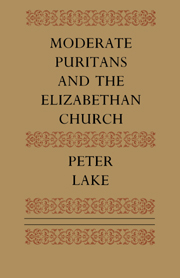Book contents
- Frontmatter
- Contents
- Dedication
- Preface
- 1 Introduction: Laurence Chaderton and the problem of puritanism
- 2 Moderate beginnings: the case of Edward Dering
- 3 Chaderton's puritanism
- 4 The moderate puritan divine as anti-papal polemicist
- 5 Thomas Cartwright: the search for the centre and the threat of separation
- 6 William Whitaker's position as refracted through his anti-papal polemic
- 7 Theory into practice: puritan practical divinity in the 1580s and 1590s
- 8 William Whitaker at St John's: the puritan scholar as administrator
- 9 The theological disputes of the 1590s
- 10 Conformity: Chaderton's response to the Hampton Court Conference
- 11 William Bradshaw: moderation in extremity
- 12 Conclusion
- Notes
- Bibliography
- Index
8 - William Whitaker at St John's: the puritan scholar as administrator
Published online by Cambridge University Press: 16 October 2009
- Frontmatter
- Contents
- Dedication
- Preface
- 1 Introduction: Laurence Chaderton and the problem of puritanism
- 2 Moderate beginnings: the case of Edward Dering
- 3 Chaderton's puritanism
- 4 The moderate puritan divine as anti-papal polemicist
- 5 Thomas Cartwright: the search for the centre and the threat of separation
- 6 William Whitaker's position as refracted through his anti-papal polemic
- 7 Theory into practice: puritan practical divinity in the 1580s and 1590s
- 8 William Whitaker at St John's: the puritan scholar as administrator
- 9 The theological disputes of the 1590s
- 10 Conformity: Chaderton's response to the Hampton Court Conference
- 11 William Bradshaw: moderation in extremity
- 12 Conclusion
- Notes
- Bibliography
- Index
Summary
The purpose of this chapter is to examine the career of William Whitaker as Master of St John's College, Cambridge. The controversies and disputes that dogged his regime can be seen, it will be argued, as the result of his reputation as a puritan and his subsequent attempts to impose a distinctively puritan discipline on the college. Under Whitaker St John's was to become a godly seminary similar to the new foundation, Emmanuel, whose master, Laurence Chaderton, was Whitaker's brother-in-law. But Emmanuel was a puritan institution; ideological consensus was the foundation on which it was built. Whitaker's attempt to achieve a similar consensus through the imposition of puritan discipline on an established institution with its own history of factional and ideological squabbles, was to provoke considerable opposition. In Whitaker's career at St John's we can see ‘puritanism’ not as some oppositionist movement, operating in contention with the predominant ideology of hierarchy and degree, but as the informing principle behind the regime of the eminently respectable Dr Whitaker. Whitaker's opponents in the college hence found themselves having to denounce Whitaker as a puritan. Yet Whitaker was neither a non-conformist nor a presbyterian. He was also, as Master of St John's, their immediate superior. The normal conformist, anti-precisian rhetoric was hence placed under considerable strain as the dissident fellows struggled to place the evasive Dr Whitaker within their recognised framework of dispute.
- Type
- Chapter
- Information
- Moderate Puritans and the Elizabethan Church , pp. 169 - 200Publisher: Cambridge University PressPrint publication year: 1982



